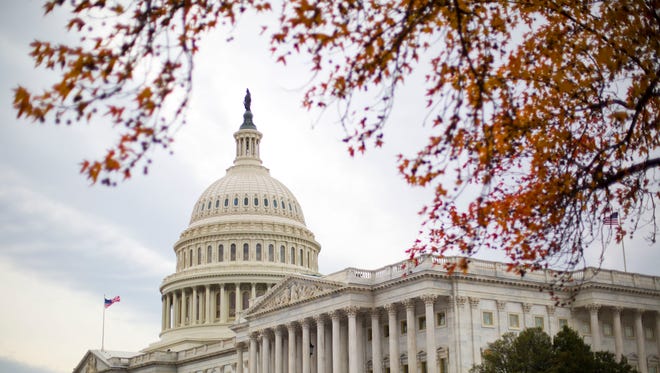Democrats own the D.C. swamp: Ross K. Baker
Democrats became politically blind to the importance of state legislatures and ceded control of them to the Republicans.

There really is a swamp in Washington, D.C. It's located on the western side of Delaware Avenue, NE right across the street from the Russell Senate Office Building. It's a space of an acre or so where small rallies are held that typically involve speeches by members of Congress unable to get a proper congressional hearing for causes they espouse.
It is not, however, the swamp that President-elect Donald Trump wants to drain. That swamp is the permanent establishment of the nation's capital — Congress, the bureaucracy, and the lobbyists. Oh yes, and the high-end restaurants, one of which just opened in the Trump International Hotel.
History endowed the Democratic Party with the ownership of Washington, D.C. Beginning in 1933with the inauguration of Franklin D. Roosevelt and his vow to deliver a "New Deal" to the American people, FDR's party has held a more-or-less permanent easement of the city. To be sure, there have been Republican presidents who inhabited the town uneasily as tenants, but the traces they have left have been largely symbolic: National Airport re-named for Ronald Reagan and a large federal office building bearing his name. But the stately edifices lining Independence and Constitution Avenues and the National mall all have a distinct Democratic architecture; from the art deco building of the Federal Trade Commission to the neoclassical home of the Federal Reserve. Throw in for good measure the Supreme Court building, a Roosevelt-era structure.
But the Democrats' claim to ownership of the capital city is broader and more complex than simply the New Deal and its vast expansion of government and broadening of regulatory authority. The federal government was looked to as the hope of African Americans trapped in the Jim Crow states of the South. And while that gaze was a forlorn one as anti-lynching bills failed to pass Congress in the 1940s, a small break came in 1948 with Democrat Harry Truman's Executive Order 9981 that desegregated the armed forces of the United States. More important still was the U.S. Supreme Court located on 1st Street, NE that issued the order desegregating schools in 1954 and a Democrat-dominated Congress prodded by Democratic president Lyndon Johnson that enacted the landmark Civil Rights Act of 1964.
Why Democrats made Harry Reid their leader: Ross K. Baker
Make D.C. a swamp again: Glenn Reynolds
POLICING THE USA: A look at race, justice, media
Post-Depression-era Democrats, if they were honest with themselves, would admit that they have an uneasy relationship with federalism. They saw the states were the bastions of segregation that yielded only to the power of the government in Washington. States gave birth to the right-to-work laws so detested by the labor unions, and the restrictions on the right to abortion that came in the aftermath of Roe v. Wade. The core Democratic constituencies — blacks, women, union members — almost always looked more kindly on Washington than on the states.
One unfortunate result of this belief in the innate benevolence of the federal government was to turn the Democrats into a kind of "court party" that disdained the states as benighted appendages of an enlightened federal government. They became politically blind to the importance of state legislatures and ceded control of them to the Republicans, who gladly took on the role of congressional redistricting that gave the GOP a virtual easement on the House of Representatives. Topeka, Harrisburg, and Augusta might not be as interesting or as grand as Washington, D.C., but it is there that the Democrats need to plant their flag.
Now, in light of the ambition of the new president to "drain the swamp," they may need to seek the high ground in unlikely places that boast fewer good restaurants than Washington.
Ross K. Baker is a distinguished professor of political science at Rutgers University and a member of USA TODAY's Board of Contributors.
You can read diverse opinions from our Board of Contributors and other writers on the Opinion front page, on Twitter @USATOpinion and in our daily Opinion newsletter. To submit a letter, comment or column, check our submission guidelines.